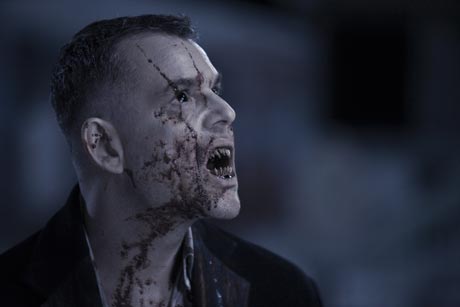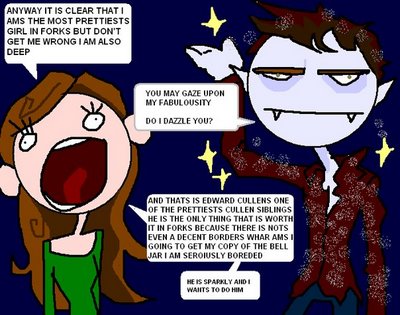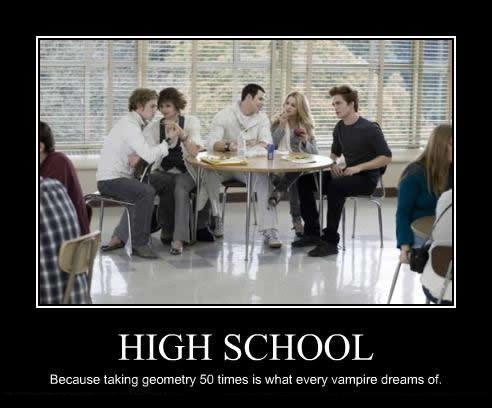If it isn’t blatantly obvious by the title of this post, I’m going to get on my soapbox for a bit on why I am so totally appalled and mind-boggled by the Twilight phenomenon. (Disclaimer: If you are a rabid Twilight fan incapable of discussing the novels in any kind of objective fashion, leave now before you’re traumatized. You have been warned.)
If you have been living under a rock on the other side of the Milky Way, you might be unacquainted with this particular work of fiction. If so, I’m going to assume you have access to Google just like everyone else. I’ll wait.
*waits*
Okay, now that we have that out of the way, here are my biggest issues with Meyer’s series:
The writing is bad, okay? It’s just bad. But Kellye! I can hear you say. A gazillion readers can’t be wrong! And anyway, there are tons of books out there that are just as badly written as Twilight, and you don’t hold them to some ridiculous standard of competent writing!
A: Actually, as an editor I do hold authors to high standards of literary competence (and maybe unfairly so – when you spend ten plus years of your life studying literature, it kind of ruins pulp fiction for you). While there are thousands of books out there that are published and poorly written, they typically languish in the midlists or on remainder tables. As Twilight, by all sane accounts, should have, because that is the level of competency it hits, both in terms of prose and the power of the story itself. But it didn’t – it became a blockbuster breakout smash with a multi-movie deal and a comic book and the hits just keep on coming. As such, I keep expecting the dead to rise from the grave, human sacrifice, dogs and cats living together, mass hysteria.
Also, there is something to be said for building on the canon that other writers have set up in genre fiction. (There is also something to be said for breaking out of that canon, but that’s the subject for another post.) Meyer does do something unique with her vampires and werewolves who captivated the imagination of millions – unfortunately, her “new take” on vampires missed the mark for me. This is probably more of a personal issue than anything else, because I’m a horror writer and because I have been reading vampire fiction for a long time. Meyer’s take on vampires and werewolves is overwhelmingly juvenile and unrealistic, given the canon. In any case, I do not associate “sparkly” with vampires, and am offended in the name of all the ravenous undead for their depiction in this manner. When I think of vampires, I think of bloodthirsty demons of the night. I want John Steakley and Stephen King. Hell, if I want my vampires a little…well…gay, I’ll go to Anne Rice or Poppy Z. Brite. But I do not want a sparkly, sniping uber-teen who is a “vegetarian”. Thirteen-year-old girls may prefer the Prince Charming version of the vampire tale, but luckily they don’t set the bar for what makes good literature – they just (apparently) set the bar for what gets published and consumed by the masses.

^ Reasonable portrayal of vampire. Notice lack of sparkles and foot-like countenance (I’m looking at you, Pattinson).
Finally, speaking of suspension of disbelief, Bella and Edward are two of the worst protagonists I have seen in a novel in a long time. Bella is underdeveloped, basically acting as a shell for the reader to project on (which works really well to emotionally manipulate romantics and thirteen-year-old girls). She’s obnoxiously dependent on Edward, even though he spends half his time being cruel or distant towards her (that’s a really good message to push on our impressionable young women). She is the epitome of a Mary Sue, which is (via Wikipedia) a fictional character with overly idealized and hackneyed mannerisms, and primarily functioning as a wish-fulfillment fantasy for the author or reader. Why is this important? Because Meyer wrote a novel with a wish-fulfillment protagonist in a really grim, harrowing time period for people across the world (and for Americans in particular). As such, Americans are especially susceptible to “wish-fulfillment” fantasy these days, as the runaway success of several escapist narratives lately will tell you. What does that say? It says that Twilight might not be the best book around (might being a laughable understatement) but it is filling an emotional want for a lot of people.

I just happen to be of the opinion that what you want and what you need are two different things.
Basically, in a nutshell, I blame Twilight for the death of Michael Jackson, the recession, and the devolution of literature at large. However, here are a couple of vampire stories I would recommend:
Guilty Pleasures by Laurell K. Hamilton (and her other Anita Blake novels)
Lost Souls by Poppy Z. Brite
Five of Cups by Caitlin R. Kiernan
Dracula by Bram Stoker
Vampire$: A Novel by John Steakley
Salem’s Lot by Stephen King
Interview with a Vampire by Anne Rice
30 Days of Night by Steve Niles
^ Out of this list, I’d have to say Five of Cups and Lost Souls are the best of the lot, even beating out my beloved King. And that’s saying a lot.
PS: Team Jacob.





